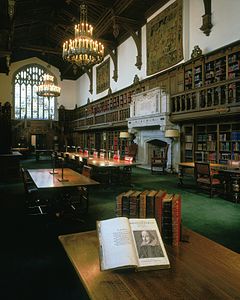Folger Theatre

The Gail Kern Paster Reading Room at the Folger Shakespeare Library, with a First Folio in the foreground.
|
|
| Country | United States |
|---|---|
| Type | Research library |
| Scope | Early modern Europe, Shakespeare |
| Established | 1932 |
| Location | Washington, D.C. |
| Coordinates | 38°53′21.7″N 77°0′11.42″W / 38.889361°N 77.0031722°WCoordinates: 38°53′21.7″N 77°0′11.42″W / 38.889361°N 77.0031722°W |
| Collection | |
| Items collected | Shakespeare-related materials, rare books, manuscripts, prints, drawings, playbills, paintings |
| Other information | |
| Director | Michael Witmore |
| Website | www.folger.edu |
The Folger Shakespeare Library is an independent research library on Capitol Hill in Washington, D.C., in the United States. It has the world's largest collection of the printed works of William Shakespeare, and is a primary repository for rare materials from the early modern period (1500–1750). The library was established by Henry Clay Folger in association with his wife, Emily Jordan Folger. It opened in 1932, two years after his death.
The library offers advanced scholarly programs and national outreach to K–12 classroom teachers on Shakespeare education. Other performances and events at the Folger include the award-winning Folger Theatre, which produces Shakespeare-inspired theater; Folger Consort, the early-music ensemble-in-residence; the O.B. Hardison Poetry Series; the PEN/Faulkner Reading Series; and numerous other exhibits, seminars, talks and lectures, and family programs. It also has several publications, including the Folger Library editions of Shakespeare's plays, the journal Shakespeare Quarterly, the teacher resource books Shakespeare Set Free, and catalogs of exhibitions. The Folger is also a leader in methods of preserving rare materials.
The library is privately endowed and administered by the Trustees of Amherst College. The library building is listed on the National Register of Historic Places.
Standard Oil of New York executive Henry Clay Folger, a Phi Beta Kappa graduate of Amherst College, was an avid collector of Shakespeareana, beginning in 1889 with the purchase of a 1685 Fourth Folio. Toward the end of World War I, he and his wife Emily Jordan Folger began searching for a location for a Shakespeare library based on their collection. They chose a location adjacent to the Library of Congress in Washington, D.C. The land was then occupied by townhouses, and Folger spent several years buying the separate lots. The site was designated for expansion by the Library of Congress, but in 1928, Congress passed a resolution allowing its use for Folger's project.
...
Wikipedia
